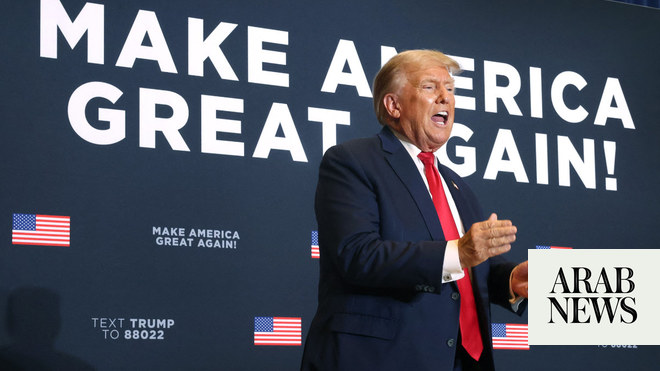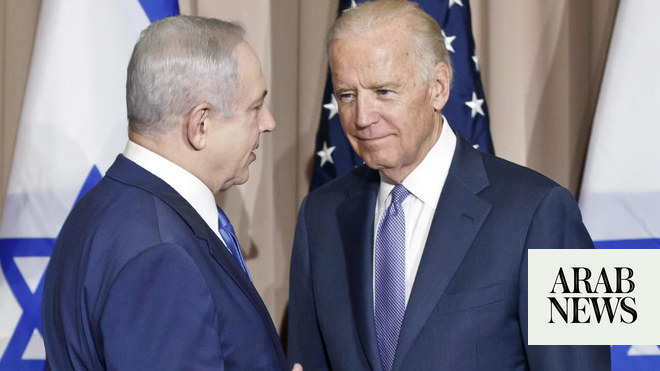
Just two weeks ago, Joe Biden was the butt of a jibe made by U.S. President Donald Trump during a conversation with Israeli Prime Minister Benjamin Netanyahu.
“Do you think ‘Sleepy Joe’ could have made this deal?” Trump asked Netanyahu in a televised phone call with his closest foreign ally about a Middle East peace initiative.
Netanyahu demurred, apparently hedging in case of a Biden victory. It was a wise move: Declared winner of the U.S. presidential election by major television networks on Saturday, Biden is the one laughing now.
Unlike many world leaders, the hawkish Israeli leader made no immediate comment after the U.S. networks called the election for the former vice president, and a picture of Netanyahu and Trump remained at the top of the Israeli prime minister’s Facebook page.
Trump, who has made repeated claims of electoral fraud without providing proof, immediately accused Biden of “rushing to falsely pose as the winner.”
Still, Israeli Justice Minister Avi Nissenkorn - a member of Netanyahu’s ruling coalition belonging to the centrist Blue and White party - swiftly congratulated Biden.
“Congratulations to US President-elect Joe Biden! Congratulations to Kamala Harris, the first woman to serve as vice president and congratulations to the American people on the proper democratic process,” Nissenkorn wrote on Twitter.
Israeli opposition leader Yair Lapid also offered his congratulations on Twitter.
“The relationship between our countries is based on deeply held values and critical shared interests which I know will be at the heart of your administration,” Lapid wrote.
POLICY DIFFERENCES
Though Biden describes himself as a Zionist and friend to nine Israeli prime ministers, friction could arise.
Netanyahu famously feuded with Biden’s former boss, Barack Obama, and he may experience policy whiplash after four years of being in lockstep with Trump - whom he praised before the election for having “isolated Iran, confronted its aggression, recognised Jerusalem as Israel’s capital, recognised our sovereignty over the Golan Heights.”
However points of difference on Mideast issues may be deferred because both Biden and Netanyahu face crises over COVID-19 and their economies.
Among the points of disagreement are Biden’s pledge to restore U.S. involvement in the Iran nuclear deal, and his likely opposition to Israeli settlement of occupied land where Palestinians seek statehood.
The rightist Netanyahu has no appetite for Palestinian statehood, which would require curtailing the West Bank’s Jewish settlers.
As vice president in 2010, Biden condemned Israel’s plan to build 1,600 homes in Ramat Shlomo, a settlement in East Jerusalem. Today, an expanded Ramat Shlomo has 16,000 residents and its own highway overpass.
But shelving chunks of Trump’s Mideast policy may not mean that Biden hastens to offer an alternative.
He has already said he will not reverse Trump’s recognition of Jerusalem as Israel’s capital.
And Biden has pledged not to condition U.S. assistance for Israel on policy changes. That suggests his disapproval of settlement activity may remain declarative.
“The Obama administration couldn’t really work up the energy to push the ‘peace process,’” said Reuel Marc Gerecht of the Foundation for Defense of Democracies. ”Joe Biden will be 78 years old on Inauguration Day. He’s been around this block. It’s too exhausting.”
One Biden adviser said that as a stopgap, the president-elect may signal to Palestinians that he will put them on a more even footing with Israel.
Regarding Iran, Daniel Shapiro, U.S. ambassador to Israel under Obama, told Reuters: “Ensuring Iran does not get nuclear weapons remains a priority, and obviously ensuring Israel’s security and working to at least preserve the two-state solution.”
He said there would likely be “prioritisation” of these behind more pressing U.S. domestic problems.












